Feeding Chickens with Your Garden: The Top Plants for a Healthy Flock
- March 5, 2024
- 0 comment
Backyard chickens are not just pets or egg producers; they are an integral part of a sustainable home ecosystem. Incorporating nutritious and medicinal garden plants into their diet enhances their health, reduces feed costs, and enriches the quality of their eggs. Herein lies a comprehensive guide to transforming your garden into a chicken paradise, ensuring your feathered friends are healthy, happy, and productive.
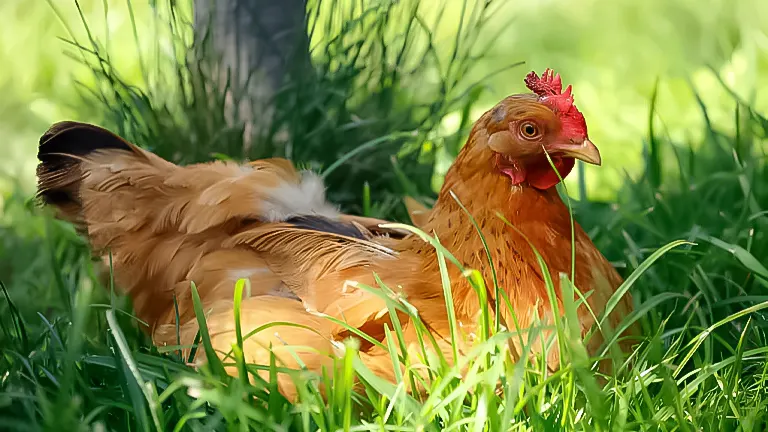
Table of Content List:
- Herbs for Health and Vitality
- Leafy Greens for Nutrition
- Seeds and Grains for Protein
- Fruit Trees and Bushes for Variety
- Vegetables for Crunch and Hydration
- Medicinal Plants for Natural Remedies
- Insect-Attracting Plants for Protein
- Avoid Toxic Plants
Why Garden Plants Matter for Your Chickens
Integrating garden plants into your chickens’ diet introduces a variety of nutrients vital for their health. Plants offer proteins, vitamins, and minerals in a natural form, often missing in commercial feeds. Additionally, certain garden plants have medicinal properties, helping to naturally ward off common poultry ailments.
Top 8 Nutritious and Medicinal Plants for Chickens
1. Herbs for Health and Vitality
Herbs such as oregano, thyme, and lavender enrich the environment with their aroma while offering potent antibacterial and antiparasitic benefits, crucial for maintaining chicken health.
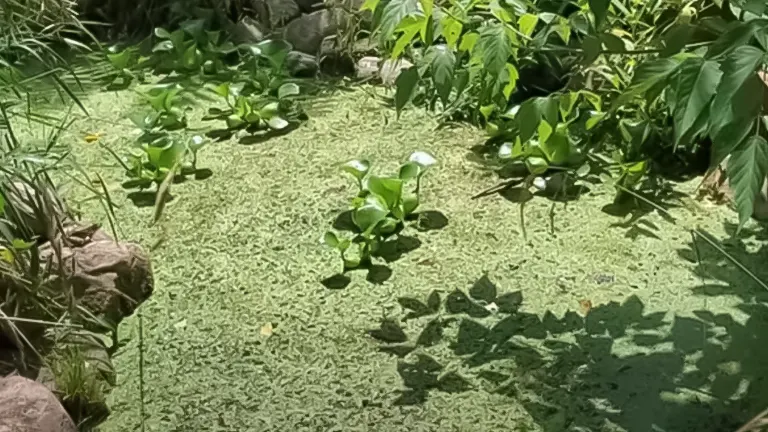
Oregano stands out as a natural antibiotic, highlighting the role of these herbs in promoting vitality among poultry.
2. Leafy Greens for Nutrition
The incorporation of leafy greens like kale, Swiss chard, and spinach into a chicken’s diet supplies essential vitamins A, C, and K, along with calcium, pivotal for strong eggshells.
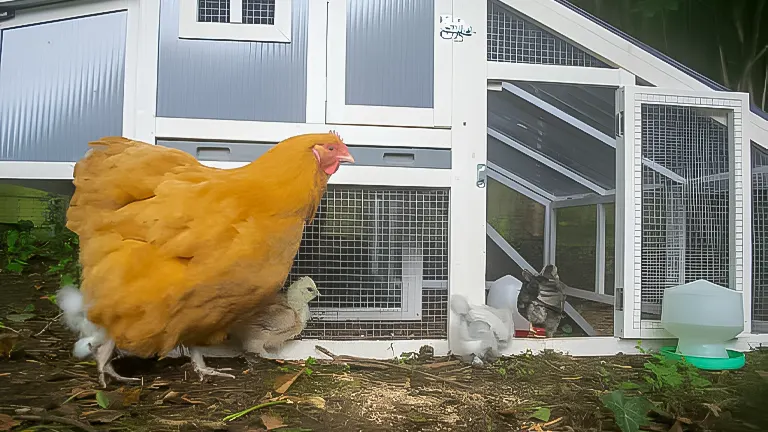
However, moderation is key, especially with spinach, to circumvent issues associated with oxalic acid.
3. Seeds and Grains for Protein
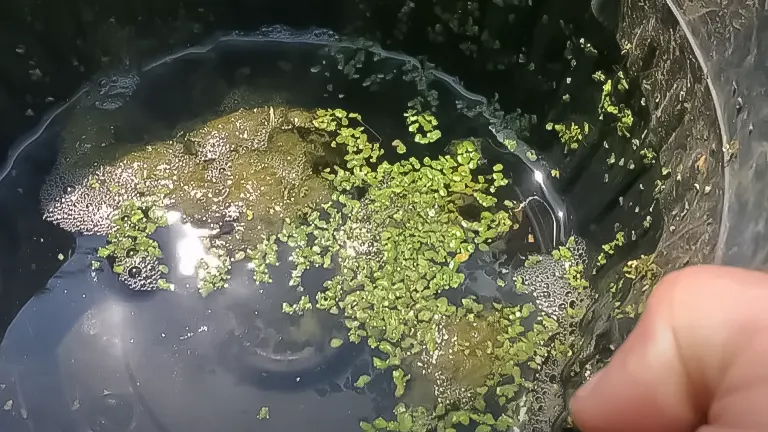
A mix of sunflower seeds, quinoa, and millet delivers the necessary proteins and fats for optimal feather health and egg production, making them ideal for scattering across the garden for chickens to forage, thereby integrating a natural dietary component.
4. Fruit Trees and Bushes for Variety
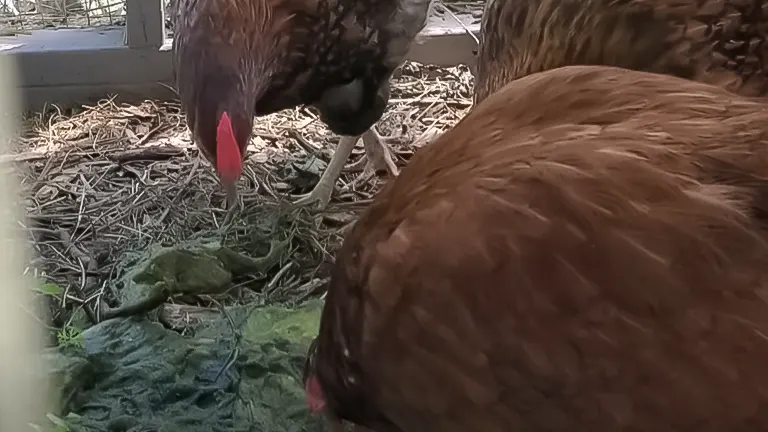
The allure of pecking at fallen fruits from trees such as apples, pears, and berries provides chickens with a delightful variety, supplying essential vitamins and hydration. Careful removal of harmful seeds, like those in apples, is necessary to ensure safety.
5. Vegetables for Crunch and Hydration
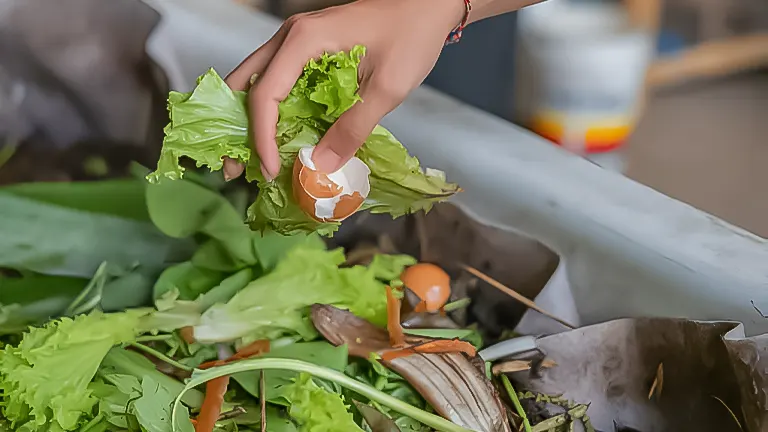
The crunch and taste of vegetables like cucumbers, pumpkins, and squashes are irresistible to chickens, offering them both hydration and a rich source of nutrients, including beta-carotene, vital for their overall health.
6. Medicinal Plants for Natural Remedies
Incorporating plants like echinacea, yarrow, and garlic into the diet boosts the immune system and offers natural infection resistance.
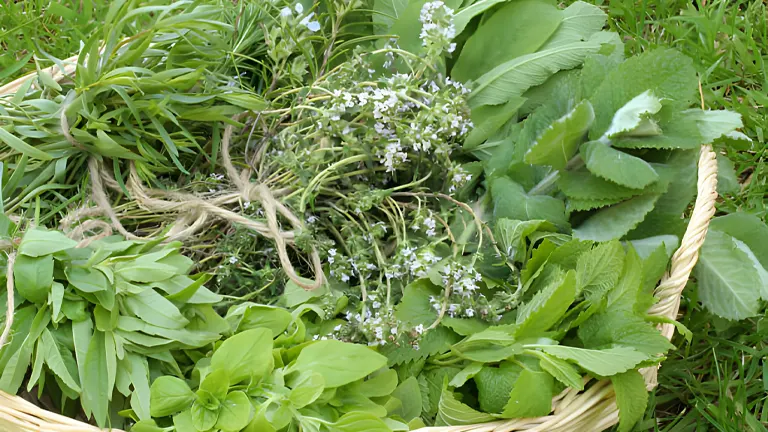
Echinacea is especially recognized for its respiratory health benefits, underscoring the therapeutic value of these plants.
7. Insect-Attracting Plants for Protein
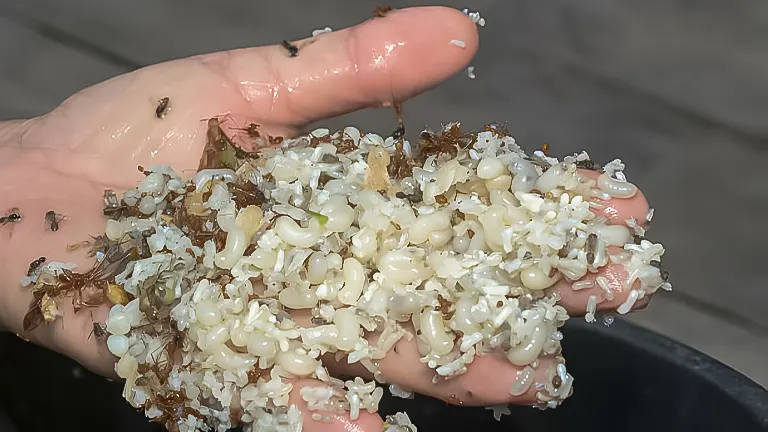
Planting flowers and plants that attract insects serves as a natural protein source for chickens. Marigolds, for example, not only lure beneficial insects but also brighten the garden and act as a natural pest deterrent.
8. Avoid Toxic Plants
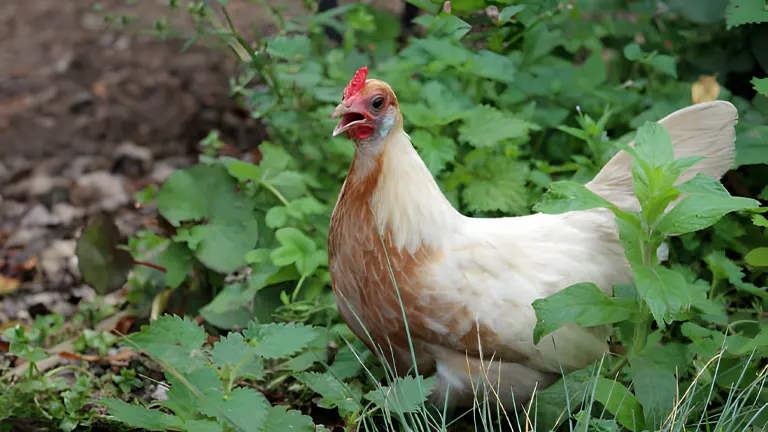
Awareness of plants toxic to chickens, such as foxglove, nightshade, and rhubarb, is critical. Keeping these plants out of reach ensures the safety and well-being of poultry, emphasizing the importance of a knowledgeable approach to garden planning.
Creating a Chicken-Friendly Garden
Designing a garden that caters to the needs of your chickens while also producing a bounty for your table requires planning. Here are key tips:
- Diverse Plant Selection: Include a variety of plants to ensure a balanced diet. This diversity also benefits the garden by attracting beneficial insects and improving soil health.
- Safe Foraging Spaces: Create designated areas where chickens can safely forage without damaging sensitive plants or vegetable beds.
- Water Features for Hydration: Small ponds or water dishes not only provide drinking spots but can also be a source of entertainment for your chickens.
- Protection from Predators: Ensure the garden is secure from predators without restricting chicken access to plants. Use fencing wisely to create safe foraging zones.
Feeding Guidelines
While garden plants can significantly contribute to a chicken’s diet, they should not replace a balanced poultry feed, which ensures they receive all necessary nutrients. Here’s how to incorporate garden plants effectively:
- Moderation is Key: Introduce new plants gradually and in small quantities to avoid digestive issues.
- Seasonal Variations: Take advantage of seasonal plants but ensure there’s a consistent supply of core nutrients year-round.
- Supplement with Commercial Feed: Continue providing quality commercial feed to fill any nutritional gaps not covered by garden plants.
Pros and Cons
Pros
- Enhanced Nutritional Intake: Introducing a variety of garden plants to chickens’ diets ensures they receive a broad spectrum of essential nutrients, contributing to their overall health and well-being.
- Natural Health Remedies: Many garden plants offer medicinal properties that naturally boost the immune system and prevent common poultry diseases.
- Reduced Feed Costs: By supplementing chickens’ diets with garden plants, you can significantly lower the expense of commercial feeds.
- Improved Egg Quality: A diet enriched with fresh garden produce can lead to higher quality eggs, characterized by stronger shells and more vibrant yolks.
Cons
- Requires Knowledge of Safe Plants: Identifying which garden plants are safe for chickens necessitates a certain level of expertise and research to avoid toxicity.
- Potential for Overconsumption of Certain Plants: There’s a risk that chickens may overeat certain plants, leading to nutritional imbalances or health issues.
- Time Needed to Establish a Diverse Garden: Creating a garden that provides a consistent and diverse supply of plants for chickens can be time-consuming and requires ongoing effort.
Additional Tips
- Seasonal Planting: Adapt your garden to the seasons to provide your chickens with a year-round variety of fresh, nutritious plants. This keeps their diet interesting and balanced.
- Dedicated Foraging Area: Set aside a part of your garden specifically for chicken-friendly plants. This allows you to control their diet closely and prevents them from disrupting other plants.
- Use Companion Planting: Implement companion planting in the chicken garden to naturally repel pests and attract beneficial insects, creating a healthier and safer environment for your chickens to forage.
Related Articles:
- Best Bedding For Chickens
- Best Safe Chicken Coop Heater
- 8×8 Chicken Coop Plans
- Turning a Shed Into a Chicken Coop
- How to Make a Chicken Coop Out of Pallets
- Best Sand for Chicken Coop
- How To Insulate a Chicken Coop
- How To Heat a Chicken Coop
- How To Keep Water from Freezing in Chicken Coop
- How to Build a Chicken Coop
- How To Build Chicken Nesting Boxes
- How to Raise Happy and Healthy Chickens in Your Backyard
- When Can Chicks Go Outside? Timing and Tips for a Smooth Transition
- 12 Reasons why Ducks are Better than Chickens
- Best Automatic Chicken Coop Doors 2024: Expert Reviews & Buyer’s Guide
- Best Fans for Chicken Coop 2024: Effective Cooling Solutions Reviewed
Final Thoughts
To sum up, enriching your chickens’ diet with a variety of nutritious and medicinal garden plants offers a dual advantage, enhancing the wellbeing of your poultry while simultaneously fostering a thriving garden ecosystem. Adhering to the recommendations provided in this detailed guide enables you to establish a harmonious, sustainable environment that bolsters the health and contentment of your chickens, reflecting a thoughtful integration of nature’s bounty into everyday care practices.
Frequently Asked Questions
- What types of garden plants are safe for chickens to eat?
Chickens can safely consume a variety of garden plants, including leafy greens like kale and spinach, herbs such as oregano and thyme, and vegetables like cucumbers and pumpkins. Always ensure plants are free from pesticides and chemicals. - Are there any garden plants I should avoid feeding my chickens?
Yes, some plants are toxic to chickens, including nightshade, foxglove, and rhubarb leaves. It’s crucial to research and avoid feeding your chickens any potentially harmful plants. - How can I introduce garden plants into my chickens’ diet?
Gradually incorporate small amounts of new plants into their diet to avoid digestive upset. Observe your chickens for any adverse reactions as you introduce each new plant. - Can feeding my chickens garden plants reduce my feed costs?
Yes, supplementing your chickens’ diet with garden plants can reduce the reliance on commercial feed, thereby lowering your overall feed costs. - Will garden plants improve the quality of my chickens’ eggs?
Feeding your chickens a diverse diet including garden plants can improve egg quality by enhancing the nutritional content of the eggs. - How can garden plants benefit my chickens’ health?
Many garden plants offer medicinal properties, such as natural antibacterial and antiparasitic effects, which can help boost your chickens’ immune system and overall health. - What are the best herbs to grow for chicken health and vitality?
Herbs like oregano, lavender, and thyme are excellent for chicken health, offering natural antibiotic properties and enhancing respiratory health. - Can garden plants attract pests to my chicken coop?
While some plants may attract insects, many garden plants, like marigolds, can actually deter pests while attracting beneficial insects that serve as natural protein sources for your chickens. - How do I ensure my chickens don’t overconsume certain garden plants?
Monitor your chickens’ intake of garden plants closely, especially when introducing new plants. Limit access to plants that should only be consumed in moderation to prevent overconsumption. - What steps should I take to create a chicken-friendly garden?
Design your garden to include a variety of chicken-safe plants, create designated foraging areas, and ensure your garden is secure from predators. Also, consider the layout to prevent chickens from damaging sensitive plants or vegetable beds.
We’re eager to connect with you! Please share your own experiences and insights on implementing “The Ultimate Guide to Nourishing Your Backyard Chickens with Garden Plants” in the comments section below. Your personal stories and advice could greatly assist fellow enthusiasts in creating a thriving, plant-rich environment for their backyard chickens. Let’s help each other make informed and nurturing choices for our feathered friends!

Edward Smith
Forestry AuthorWoodworking is about more than crafting; it's a harmonious connection with nature, mastering tools, and preserving our environment. I'm here to share my knowledge and experiences with you, forging a future where we can embrace wood's beauty and utility while safeguarding our forests' health and diversity.







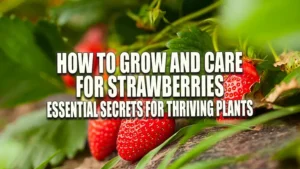

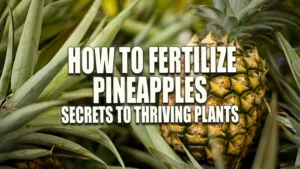


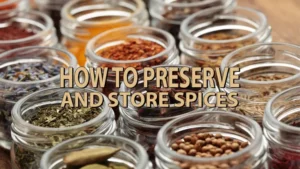
Leave your comment